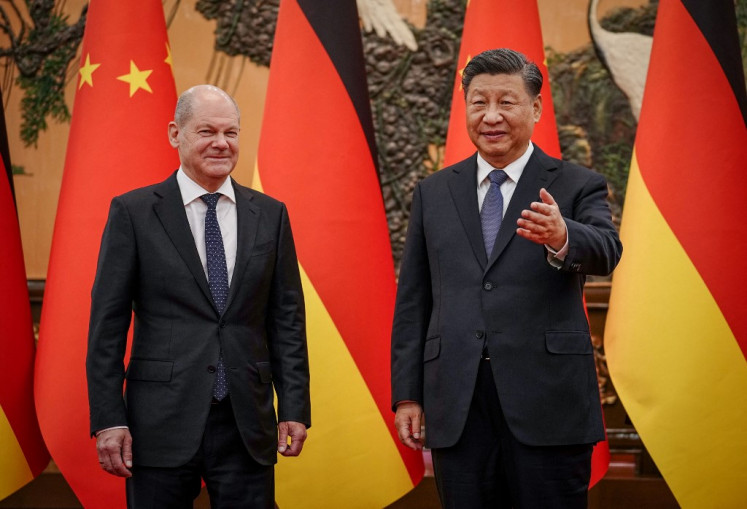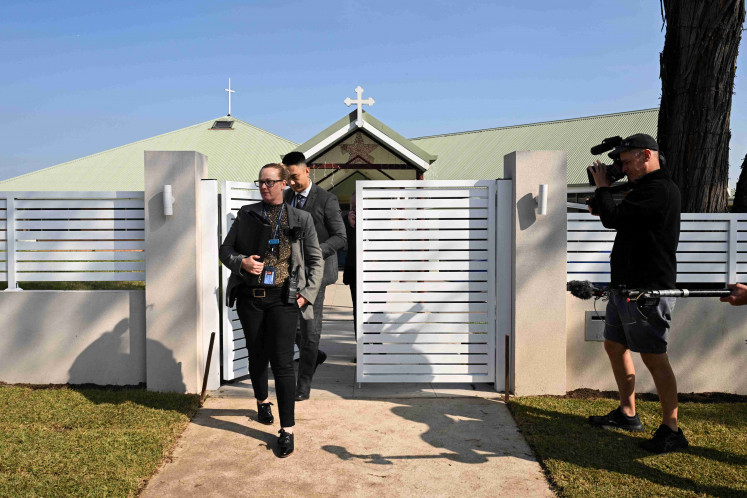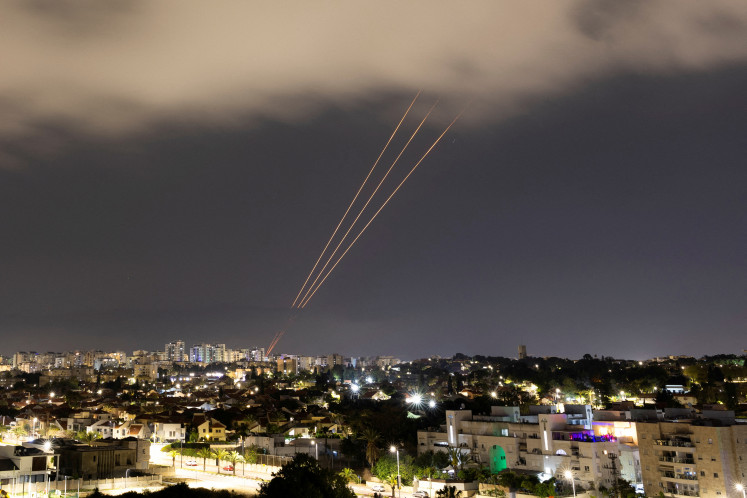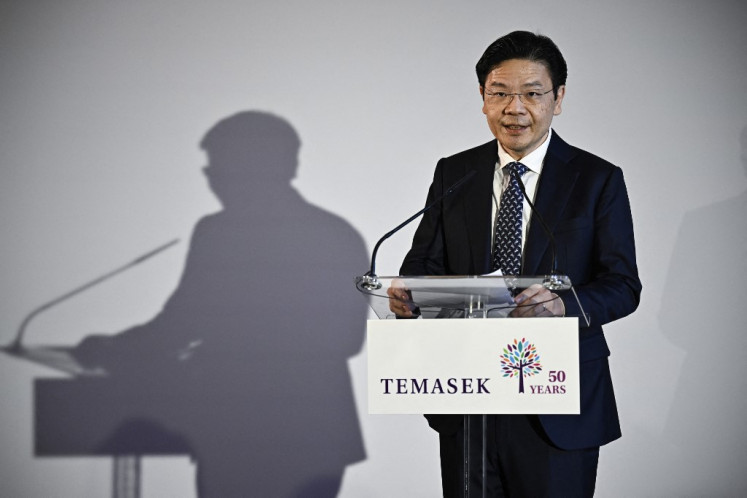Ukraine woes may cement North Korea's resolve to hang on nuclear arsenal
Looking at the situation unfolding in the former Soviet republic, North Korean leader Kim Jong Un will likely conclude that possessing nuclear weapons is the most reliable way to maintain his family's dynasty, which began when the country was established in 1948 with the backing of the Soviet Union, foreign affair experts said.
Change Size
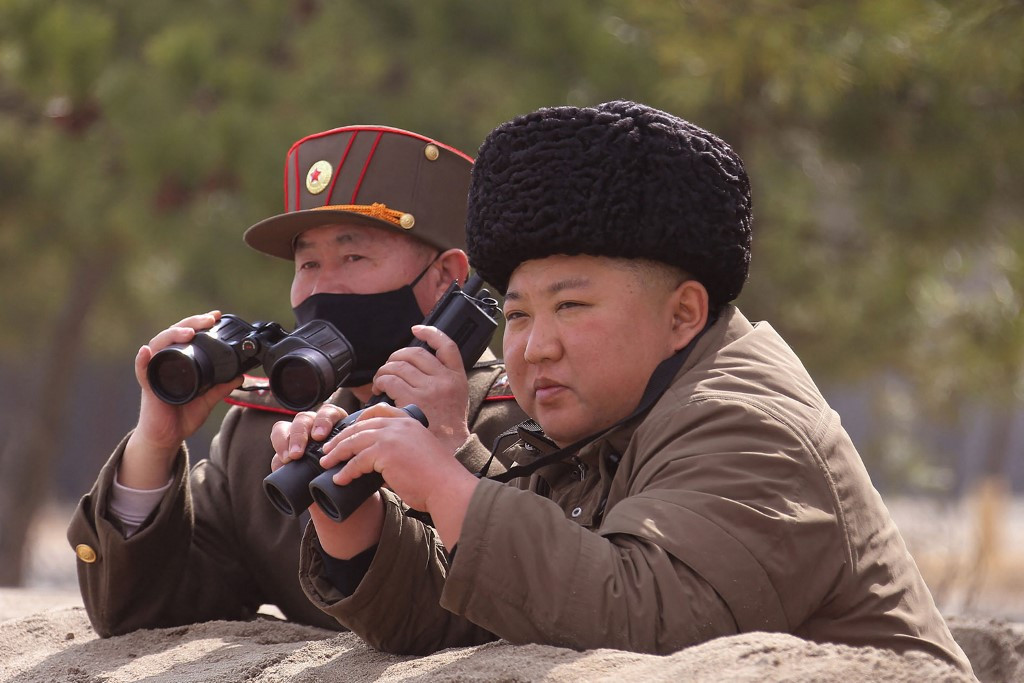 This file picture taken on March 9, 2020 and released from North Korea's official Korean Central News Agency (KCNA) on March 10, 2020 shows North Korean leader Kim Jong Un (R) supervising a 'strike drill' together with a high ranking officer at an undisclosed location in North Korea. (AFP/STR/KCNA VIA KNS)
This file picture taken on March 9, 2020 and released from North Korea's official Korean Central News Agency (KCNA) on March 10, 2020 shows North Korean leader Kim Jong Un (R) supervising a 'strike drill' together with a high ranking officer at an undisclosed location in North Korea. (AFP/STR/KCNA VIA KNS)
R
ussia's aggression in Ukraine, which gave up its huge nuclear arsenal 30 years ago in return for security guarantees by world powers, is expected to reinforce North Korea's determination not to give up its own nuclear weapons.
Looking at the situation unfolding in the former Soviet republic, North Korean leader Kim Jong Un will likely conclude that possessing nuclear weapons is the most reliable way to maintain his family's dynasty, which began when the country was established in 1948 with the backing of the Soviet Union, foreign affair experts said.
And since the Ukraine crisis is likely to absorb the attention of the United States and its allies, Pyongyang will probably see it as an opportunity to try to strengthen its nuclear and missile capabilities, they added.
Russia's invasion of Ukraine has made North Koreans recognize that "multinational agreements will not amount to true guarantees of their survival and peace," said Young-Key Kim-Renaud, a professor emeritus at the George Washington University in the US capital.
"The current North Korean regime sees its nuclear and missile program as an existential matter and is willing to further sacrifice economic and social conditions," said the specialist in Korean Peninsula affairs.
The United States and North Korea remain technically in a state of war as the 1950-1953 Korean War -- in which US-led UN forces fought alongside South Korea against the North supported by China and the Soviet Union -- ended in a cease-fire, not a peace treaty.
Ukraine signed the Budapest Memorandum and joined the Nuclear Non-Proliferation Treaty in 1994, agreeing to abandon all the nuclear weapons piled up on its territory before the Soviet Union collapsed in 1991. At the time, it was the world's third largest nuclear stockpile.
At the same time, the United States, Britain and Russia, later joined by China and France, pledged to guarantee Ukraine's territorial integrity under the memorandum. All five are nuclear weapons states and permanent UN Security Council members.
Nevertheless, even before Russia launched its aggression against Ukraine late last month, it had annexed the Crimean Peninsula from its neighbor in 2014 and is seen as having been behind the conflict that broke out the same year in the Donbas region that led to the formation of breakaway areas.
But while Western nations and others are imposing stringent sanctions on Moscow, the administration of US President Joe Biden has ruled out sending troops to fight Russia in Ukraine.
South Korea's JoongAng Ilbo newspaper said in its editorial in late February that the Ukraine crisis "could set a bad precedent for North Korea."
"Watching Ukraine without any nukes being invaded by Russia, North Korea could be even more determined to develop nuclear weapons," the daily said.
At the first-ever US-North Korea summit in June 2018, Kim and former US President Donald Trump, Biden's predecessor, agreed that Washington would provide security guarantees to Pyongyang in exchange for "complete denuclearization" of the Korean Peninsula.
But negotiations between the two countries over denuclearization and sanctions relief have been at a standstill for more than two years since North Korea effectively refused the US demand to scrap all of its nuclear facilities and programs.
While calling on the United States to drop its "hostile policy," North Korea has recently hinted at restarting nuclear and intercontinental ballistic missile tests, saying it may resume all "activities" it had temporarily suspended to build trust with Trump.
A diplomatic source in Beijing said, "North Korea has claimed that Iraq and Libya, which did not have nuclear weapons, were invaded and their regimes were overturned by the United States. For Kim, abandoning the nuclear arsenal is not a rational decision."
In the wake of the attack on Ukraine by Russia, "North Korea has become more skeptical about a promise of security guarantees without practical benefits in return for denuclearization," the source added.
Troy Stangarone, a senior director at the Korea Economic Institute in Washington, echoed the view, saying, "The Budapest Memorandum is vague on how Ukraine's security would be assured."
"Security assurances are worthless without real commitments to provide assistance," he said. "Whether friend or foe, strong states still attack the weak. This reality means it will be increasingly difficult to convince North Korea to give up its nuclear weapons."
Pyongyang, meanwhile, has carried out a spate of weapons tests since early 2022. In late January, it launched its longest-range ballistic missile since November 2017 in defiance of UN Security Council resolutions imposing sanctions on it.
During the 17-day Beijing Winter Olympics through Feb. 20, North Korea refrained from firing projectiles in apparent consideration of China, its key ally in security and economic terms. But Pyongyang conducted a test of a reconnaissance satellite system last Sunday.
As launching long-range ballistic missiles carrying warheads and rockets capable of delivering satellites use similar technology, speculation has been rife that Pyongyang might be preparing to fire an ICBM that could reach the US mainland with a nuclear payload.
Later this month, the United States and its security ally South Korea are scheduled to stage joint military exercises that the North has slammed as a "rehearsal for war," probably prompting Pyongyang to take provocative actions against the two countries.
North Korea, whose economy has languished amid the COVID-19 pandemic, will also mark the 110th anniversary on April 15 of the birth of Kim Il Sung, the nation's late founder and the current leader's grandfather. Pyongyang has often held military events on the occasion.
"In an anarchic world ruled by the law of the jungle, North Korea must not be so naive as to give up its nuclear weapons," said Zhao Tong, a senior fellow in the Nuclear Policy Program at the Carnegie Endowment for International Peace in Beijing.
With North Korea regarding the United States as its mortal enemy since the Korean War, Pyongyang "has a strong technical need to carry out more flight tests of its strategic missiles" including ICBMs, Zhao said.





